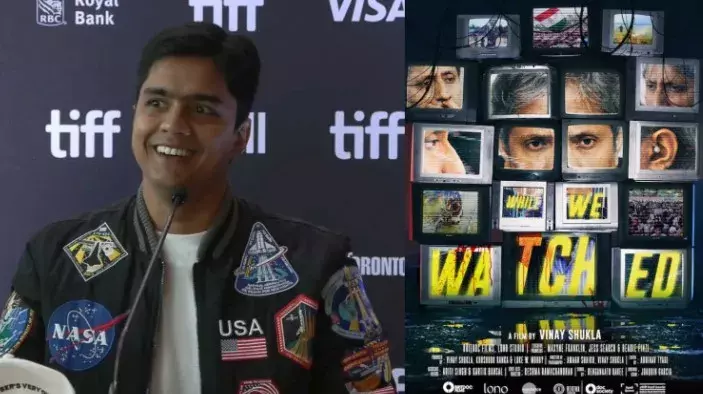‘While We Watched’ Holds A Mirror To The Media
The documentary is the story of loneliness felt by those who fight the mainstream

“Namaskar! Main Ravish Kumar”, thus begins the trailer of ‘While We Watched’ the documentary that the whole wide world is raving about, while we wait patiently for it to be released in India. But this isn’t about the hero; the man with a dry, whimsical humour; the media godfather who coined the term Godi.
It is about a gutsy young director Vinay Shukla, whose second feature documentary ‘While We Watched’ won the prestigious Amplify Voices Award. Ever since, as he continues to win global accolades, I feel more and more interested to see the documentary.
When NEWS, an acronym for North, East, West and South, instead of enlightening us, either makes us mad or sad; when it becomes a propaganda being stirred with a poisonous rhetoric; when it becomes a melodrama of downgraded, failed, fake, fictitious, chichora kind of ‘misinfotainment’; then you feel it is better to cut off this limb from our body and stay away from it.
But is that the solution? Whether we like it or not, news is, was and will always be the major system of public information. But to make our life better, in terms of choices of the culture and in terms of how to make a better tomorrow, what we need is serious balanced journalism.
When Vinay Shukla was asked about the gist of the documentary, he said it was a story of loneliness felt by people who fight against the mainstream. That mainstream can be anything, either political, entrepreneurial, business or even personal.
It is never easy to stand against the tide and face the tsunami of cheerleaders, or trolls, and still continue to focus on the human stories that are relevant. This crisis afflicting journalism is not just in India but across the globe, and the film which is less an inspiring tale but more of a ‘wake up call’ resonates with many in the eclectic audience.
He also felt that it was like ‘Titanic’, but the story is not about Jack and Rose. It’s about the people who stayed back and continued playing their violins when the ship was sinking.
It was about those who wanted to go out playing what they were good at; all those stupid people who decided to sink with the Titanic, playing their music hoping that someone, somewhere would be able to hear it. WOW! If it is about such ‘fools’ who keep fighting for all, trying to make things better; if it is not about winning a big battle but attaining smaller victories, then I’m so looking forward to seeing it.
When Shukla was asked why Ravish Kumar, he said he chose him because Ravish reminded him of himself. He saw in Kumar a ‘tired hero’ who had seen better and who was now beginning to wonder if he was still relevant in this world.
In Kumar he experienced the kind of vulnerability in the current news environment. In Kumar, he also found a man whose nerves had begun to fray from carrying the torch of 'good journalism' for too long. So Shukla wanted to explore that ‘soft space’ embedded in every human and highlight it.
It’s easy to understand why the young director felt the same ‘tiredness’, because in an untrodden path, one is always alone. Even if we tend to villainize the other side thinking only we are experiencing the forlornness and hopelessness, in reality we are all desperate.
Shukla calls this feeling ‘Vidroh ki Mayoosi’. “Perhaps this isolation in rebellion’ is quite dear because as I see it, in a hopeless situation, even Hope doesn’t come cheap. I don’t know how much strength I have in me to be able to rebel, but the sense of forlornness, the feeling of exhaustion is definitely there. But the desire to save my country from committing a Harakiri is much stronger” said Shukla.
Artistes always feel that they will create something that will improve the collective consciousness of the general public. But artists are also human so there are days when you get disheartened and wonder if whatever you are doing is even worth it.
If the people you are doing it for, do they really care? Or are they happy living in their own unburstable bubble? This painful churning is perhaps what every ‘lonely’ artist goes through. Of starting to question your own relevance to society.
Or to know just how strong or how tenuous is the thread that binds you to it. So yes, if it is a documentary made by such a sensitive young man with a beautiful mind, a gorgeous soul, who speaks the same language as me, I do want to watch the film.
Power is an influential tool, but in the wrong hands it can cause damage and destruction. At a time when the media at large is becoming an instrument of propaganda and misinformation, fortunately there are many soldiers who are upholding the ideals of independence and accountability.
Not all of us need to sign the same memorandum of understanding. Most of us just want a good family, healthy life, and peace around us. But some of us see differently and want to push culture to a better place, make life different and less difficult for everybody.
But most importantly do not want a fractured India. So we don’t need to sign up for the same battles. But. We should definitely agree on the common good for all. Namaskar!


